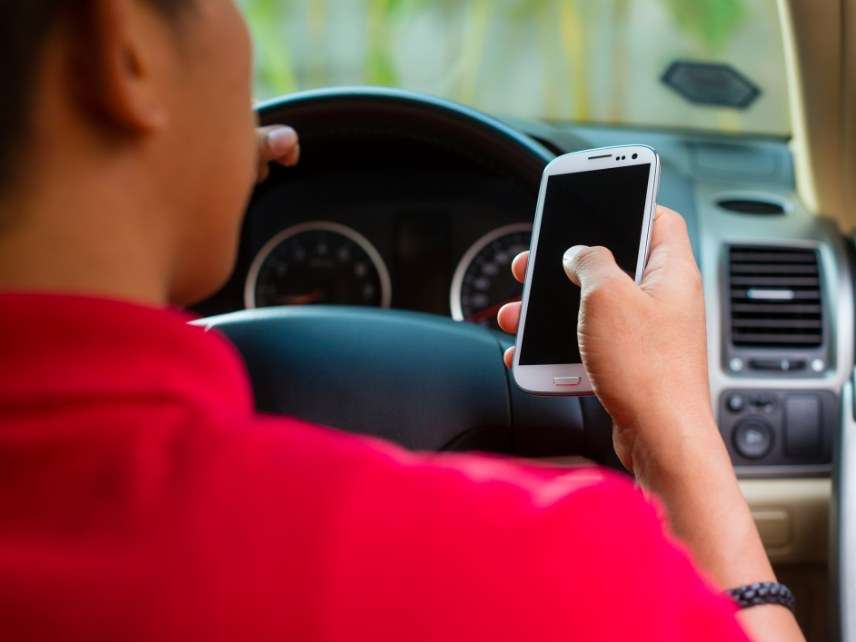New York Lawmakers Back Unwarranted Phone Searches of Drivers
On the pretext of texting safety, they want to give cops free rein to suspend licenses and fine drivers without charges or conviction.

Lawmakers in New York want to give police the authority to search without a warrant phones of people involved in crashes to crack down on drivers texting behind the wheel.
If that weren't intrusive enough, the bill would authorize police to immediately suspend the driver's license for a minimum of one year of anybody with the temerity to resist a search. And this suspension, along with fines of $500 to $750, would stick regardless of whether or not the person was ultimately found guilty of a crime.
This significant end run around citizens' rights to privacy and due process gets only the slightest attention from a recent NBC News story. Instead, NBC was on hand to hype the technology involved.
Mobile forensics text company Cellebrite is working on a tool called the "textalyzer," which they're marketing to lawmakers and police agencies as a breathalyzer for phones. Connect the textalyzer to a phone and it is able to determine what you had been doing with it at any time, including which apps had been recently used.
This is private data that could be used to implicate people for crimes. A representative for the American Civil Liberties Union worried that police could use it to get all sorts of additional information. The CEO of Cellebrite says it can't access actual communications data; it's just determining what you're accessing. They're essentially arguing, "We're not trying to snoop on the content of your conversations, but we still think we should be able to access your data in order to collect potential evidence of a crime."
And they should be able to—once they get a warrant. But for those supporting Senate bill S2306 (and its Assembly counterpart A3955), the process of getting a warrant is just too much work. The bill is being pushed along by the father of a teen killed in a car crash, so it's a familiar case of a tragedy leading to poorly thought-up, rights-violating legislation. Ben Lieberman's son, Evan, was killed in a car crash in 2011 and Ben found out months after the fact that the driver of the car he was in had been texting.
"We often hear, 'just get a warrant' or 'just get the phone records.' … The implication is that the warrant is like filling out some minor form," he says. "It's not. In New York, it involves a D.A. and a judge. Imagine getting a D.A. and a judge involved in every breathalyzer that's administered, every sobriety test that's administered."
Lieberman filed a civil lawsuit to subpoena the phone records, which showed the driver had been texting before the crash. But even getting the phone records won't tell you much, he says. "It doesn't detect any of the important distractions, like email, social media or Web browsing."
Advocates keep making the breathalyzer comparison for a reason: Courts have ruled that these types of sobriety tests are not terribly intrusive and therefore do not require a warrant. But what this law actually proposes is forcing drivers to allow police to access private, personal data. (It's also worth observing that Lieberman is working directly with Cellebrite, according to NPR, so the advocate for the legislation is partnering with the company that wants to provide the tools that would be used.)
A more accurate comparison would be North Dakota's law that punished suspected drunken drivers for refusing to submit to warrantless blood tests. That's the law the Supreme Court struck down as unconstitutional because of its intrusiveness.
Legislators had hoped to pass it by the end of their session this month, but the bill didn't make it. To be clear, though, its prospects are not dead, and the state Senate's Transportation Committee gave it a unanimous thumbs up.
Expect to see it back next year.


Show Comments (101)